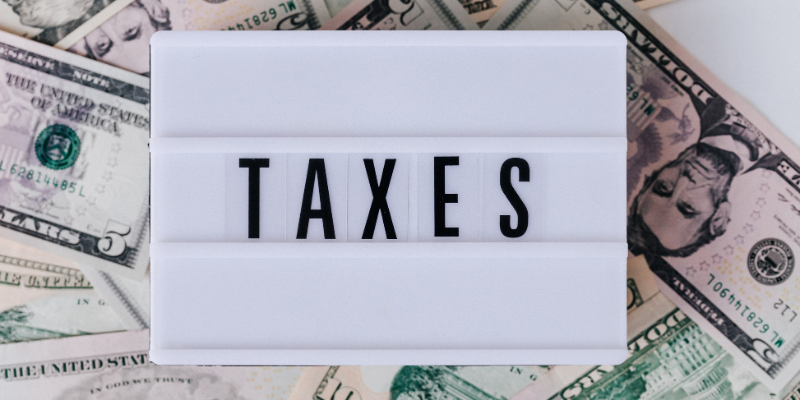
Key Considerations for Maryland Home Sellers: Taxes and Fees
Understanding the tax implications and their associated expenses is crucial for a Maryland homeowner attempting to maximize the selling price of a property. Similarly, Maryland sellers need to be cognizant of the transfer tax, which, by general custom, has both the seller and the buyer assuming responsibility, unless other stipulations are made.
Moreover, local county transfer taxes may apply, which differ from place to place. In addition, capital gains tax is an important consideration; if your home value has significantly appreciated, you could face federal capital gains taxation on the profit realized from the sale.
Besides, if the ownership and use tests are satisfied, primary residence exemptions may restrict such liability. In addition, sellers pay property taxes at closing just like other customary closing costs, including title insurance and recording fees.
Maryland property sellers should consider these possible expenses and tax obligations and prepare in advance for the sale of their home.
Comprehensive Guide to Maryland Property Sale Tax Implications
Also, homeowners must know the tax implications of selling a house in Maryland. The state levies state and local transfer taxes on real estate sales, which are typically charged as a percentage of the sale price.
Moreover, sellers may incur additional capital gains tax liability, particularly when the property value has escalated relative to the purchase price. On the other hand, individuals who sell their primary home may be eligible for a partial exclusion of capital gains tax if they occupied the residence for two of the five years preceding the sale, which provides a favorable reduction in taxable income.
Besides, non-resident sellers have particular withholding stipulations set out by the Comptroller’s Office of Maryland relevant to state tax compliance. All existing municipal or special assessment taxes ought to be noted for their effect on the estimated net proceeds from the sale.
Panda Pro Home Buyers connect you to a professional who can help you with the tax implications when you sell your house; consulting with a qualified real estate attorney or tax professional can help navigate these complexities and ensure all tax liabilities are appropriately managed during the transaction process.
What Are the Taxes on Selling a House in Maryland?

When selling a house in Maryland, there are several taxes and financial considerations to keep in mind:
- Maryland State Transfer Tax
- This is one of the central taxes applied during a home sale in Maryland.
- The state typically charges a transfer tax of 0.5% (not 5%—please confirm this as 5% seems unusually high unless there’s a typo in your original text).
- This tax is usually split between the buyer and seller unless negotiated otherwise.
- County Transfer Taxes
- In addition to the state tax, many Maryland counties impose local transfer taxes.
- These rates vary significantly by county.
- For example, Montgomery County and Prince George’s County have specific local rates that sellers should account for.
- Capital Gains Tax
- If your property has appreciated since purchase, you may be subject to federal capital gains tax.
- The IRS provides exemptions of $250,000 for single filers and $500,000 for married couples filing jointly, provided the home was your primary residence for at least two of the past five years.
- Maryland does not levy a separate state capital gains tax, but the gain may still affect your overall state tax return.
- Potential Tax Exemptions
- Taking advantage of the primary residence exclusion can reduce or eliminate your capital gains tax liability.
- Certain costs related to improvements and selling expenses may also reduce your taxable gain.
- Professional Guidance
- It is highly recommended that you work with a real estate professional or tax advisor who understands Maryland’s tax laws and local market conditions.
- They can help ensure compliance, identify applicable exemptions, and maximize your financial return.
Contact us for legal advice and expert guidance on the taxes you must comply with when selling your home.
Do I Have to Pay Taxes When I Sell My House in Maryland?
Understanding the tax implications is crucial when selling your house in Maryland. If your home has appreciated, you may need to pay capital gains tax.
However, specific exclusions and deductions can reduce or eliminate this tax burden. The IRS allows a primary residence exclusion of up to $250,000 for single filers and $500,000 for married couples filing jointly, provided conditions are met.
To qualify for this exclusion when selling your Maryland home, you must have owned and lived in the property as your primary residence for at least two of the five years preceding the sale. Additionally, state taxes may apply depending on your residency status and the overall profit from the sale.
It’s essential to consult with a tax professional familiar with Maryland’s real estate laws to ensure compliance and optimize any available tax benefits when you sell your home for cash in Gaithersburg and other cities in Maryland. Understanding these factors can help you navigate Maryland’s tax landscape effectively while maximizing your financial outcome from the sale.
What Is Exempt From Sales Tax in Maryland?
When considering real estate transactions in Maryland, cash home buyers in Frederick and surrounding cities in Maryland, as well as sellers, must understand the state’s tax landscape, particularly what is exempt from sales tax. While many goods and services are subject to sales tax in Maryland, certain items are exempt.
For instance, most groceries, prescription medications, and residential utilities such as electricity and gas remain untaxed. Additionally, the sale of real property, like homes, is not subject to sales tax but instead falls under other types of taxes, like transfer and recordation taxes.
These exemptions can significantly impact the overall cost considerations during a real estate transaction. Homebuyers should be aware that although they won’t pay sales tax on the purchase price of a home, they may still face other financial obligations such as property taxes and closing costs.
Meanwhile, sellers need to consider potential capital gains taxes but can avoid sales tax on the actual transaction of selling their property. Understanding these exemptions helps buyers and sellers plan financially for their real estate ventures in Maryland’s market.
Does a seller pay transfer tax in Maryland?

Understanding the tax implications when you sell a portion of your property in Maryland is crucial, particularly regarding transfer taxes. Yes, sellers in Maryland may be responsible for paying a portion of the transfer tax during the sale of their property. The state imposes a transfer tax on real estate transactions that typically amounts to 5% of the sales price. Additionally, counties within Maryland may impose their own transfer taxes, which can vary significantly.
For instance, Montgomery County has its specific rates and rules. Traditionally, the payment of these transfer taxes is negotiated between the buyer and seller as part of the sales contract; however, it’s common for both parties to share this cost equally unless otherwise agreed upon.
Understanding who pays what part of the transfer tax is essential for sellers to accurately calculate potential costs and net proceeds from their home sale. Consulting with a real estate attorney or tax professional can clarify how these taxes affect your transaction in Maryland.
Do I Pay Taxes to the IRS When I Sell My House?
Understanding the tax implications when selling your home in Maryland is crucial, especially regarding potential obligations to the IRS. Generally, when you sell your primary residence, the IRS allows homeowners to exclude up to $250,000 of capital gains from taxation if filing individually and up to $500,000 if married and filing jointly.
However, certain conditions must be met: the home must have been your primary residence for at least two of the five years preceding the sale. If these criteria are satisfied, you might not owe taxes on the profits from your home sale.
It’s essential to consider any significant improvements to increase the property’s basis and consult with a tax professional about reporting requirements or exceptions. Understanding these IRS rules can help ensure you correctly manage any taxable income when selling your house in Maryland.
How Is Property Tax Determined in Maryland?
In Maryland, property tax determination is crucial for homebuyers and sellers involved in real estate transactions. Property tax is calculated based on the property’s assessed value, which is determined by the State Department of Assessments and Taxation (SDAT).
The SDAT conducts assessments every three years to ensure accurate property valuations. These assessments take into account factors such as market trends, property condition, and improvements made to the home.
Once the property assessment is complete, local tax rates set by county and municipal governments are applied to determine the total annual property tax liability. Maryland homebuyers and sellers should understand that these tax rates can vary significantly depending on the property’s location within different jurisdictions.
Additionally, various exemptions and credits, such as homestead tax credits, are available, which can affect overall tax obligations. Awareness of how property taxes are determined in Maryland helps buyers budget accurately and informs sellers about the potential costs of selling their homes.
How Much Is Capital Gains Tax on Real Estate in Maryland?

Understanding the capital gains tax implications when selling your home in Maryland is crucial for effective financial planning. In Maryland, as in the rest of the United States, capital gains tax on real estate is calculated based on the difference between your home’s selling price and adjusted cost basis.
The federal capital gains tax rate can vary, typically from 0% to 20%, depending on your income level. However, suppose you’ve owned and lived in your primary residence for at least two of the five years before the sale. In that case, you may qualify for a significant exclusion—up to $250,000 for single filers and $500,000 for married couples filing jointly.
This exclusion can substantially reduce or even eliminate your taxable gain. It’s important to note that Maryland does not impose an additional state-specific capital gains tax; however, any realized gain may affect your overall state income tax liability.
Consulting with a tax professional or financial advisor who understands federal and Maryland state tax laws can ensure you take advantage of all applicable deductions and exemptions when selling your home.
Does Maryland Tax Sale of Primary Residence?
Understanding the tax implications when selling your primary residence in Maryland is crucial. In Maryland, the sale of a primary residence can have specific tax consequences that homeowners must be aware of.
Generally, if you meet certain conditions, the gain from the sale of your home may be exempt from federal capital gains tax under IRS Section 121. This means that individuals can exclude up to $250,000 of profit from taxable income, while married couples filing jointly can exclude up to $500,000.
However, this exclusion applies only if you have owned and lived in the home as your primary residence for at least two of the five years preceding the sale. It’s important to note that Maryland doesn’t impose a state-specific capital gains tax; gains are subject to federal taxation rules.
Homeowners should also consider any local transfer taxes or recordation fees that may apply during the transaction process. Consulting with a tax professional familiar with Maryland’s real estate laws is advised to ensure compliance and optimize financial outcomes when selling your primary residence in Maryland.
How Are Property Taxes Handled at Closing in Maryland?
When selling your home in Maryland, understanding how property taxes are handled at closing is crucial for buyers and sellers. In Maryland, property taxes are typically prorated between the buyer and the seller at closing.
This means that the seller is responsible for covering property taxes until closing, while the buyer assumes responsibility from that point forward. The settlement agent or title company usually calculates the exact amount each party owes based on the current tax year’s assessment.
It is important to note that Maryland operates on a fiscal calendar for property taxes from July 1st to June 30th of the following year. Therefore, if you close mid-year, adjustments must be made so that each party pays their fair share of annual property taxes.
Sellers should be aware of any outstanding liens or unpaid property taxes before closing, as these must be settled to ensure a smooth transaction. Understanding these nuances can help avoid unexpected financial burdens and facilitate a seamless transition during the home-selling process in Maryland.
Do you need to sell your home? Sell quickly, avoid costly repairs, or prefer a hassle-free sale. Panda Pro Home Buyers is here to help. We offer fair cash offers, handle all the details, and make the process seamless. Ready to sell or have questions? Call us at (410) 775-8558 for a no-obligation offer. Get started today!
| TAXED | STATE OF MARYLAND | PROPERTIES | UNREALIZED GAINS | CAPITAL GAINS TAXED | CAPITAL GAIN TAXES |
| REAL ESTATE TAX | INCOME TAXES | INCOME TAX | INCOME TAX RATE | EXEMPTIONS | TAX EXEMPTIONS |
| TAX RATES | ASSET | BROKER | REAL ESTATE AGENT | REAL ESTATE BROKER | REAL ESTATE AGENT OR BROKER |
| MARKET | DEDUCTIONS | LEGAL SERVICES | LAWYER | INVESTMENT | INVEST |
| INVESTING | SAVINGS | WEALTH | ORDINARY INCOME | TRUSTS | TAX-PLANNING |
| TAX PLANNING | STOCK | EMAILS | INVESTMENT PROPERTY | INVESTMENT PROPERTIES | ESTATE AGENT |
| TAX LAWS | MONEY | LENGTH | INTEREST | EXPENSES | TAX CREDIT |
| STATE INCOME TAX | PAYMENTS | HOMEBUYERS | INVESTORS | INVENTORY | MORTGAGE LOAN |
| KNOWLEDGE | ESTATE TAXES | INFORMATION | INCENTIVES | DOLLAR | DOCUMENT |
| CAPITAL ASSET |
